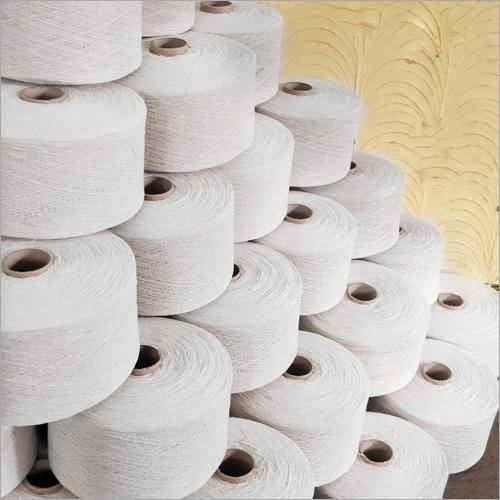Recycled Yarn Supplier Challenges in 2025 & How We Solve Them

In 2025, the textile industry is witnessing a major shift toward sustainability, circularity, and conscious manufacturing. Among the leading players in this transformation are recycled fiber yarn suppliers — the backbone of eco-conscious fabric production.
As demand for recycled yarn continues to grow globally, suppliers face several challenges across logistics, quality control, compliance, and scalability. Yet, forward-thinking suppliers are not only addressing these hurdles — they’re using innovation, partnerships, and transparency to lead the way.
In this blog, we uncover the biggest challenges faced by recycled fiber yarn suppliers in 2025 and how industry leaders are overcoming them to meet the expectations of brands, manufacturers, and conscious consumers.
1. Challenge: Fluctuating Availability of Raw Textile Waste
Problem:
Sourcing consistent, high-quality textile waste is becoming more competitive as recycled fiber yarn manufacturers scale up operations. Regions with low waste segregation or textile recycling infrastructure make sourcing difficult.
Our Solution:
We’ve partnered with multiple textile waste aggregators and sorting facilities to ensure a steady supply of pre- and post-consumer waste. Our multi-sourcing strategy reduces dependency on one region and keeps our supply chain resilient even during high demand.
2. Challenge: Maintaining Consistent Yarn Quality
Problem:
Recycled fiber yarn can have varying fiber lengths, color inconsistencies, or strength issues — especially when mechanically processed. This inconsistency can affect the performance of the final textile product.
Our Solution:
We’ve invested in advanced fiber blending, carding, and spinning technologies that stabilize yarn strength and quality. Our in-house lab conducts regular tensile strength, colorfastness, and pilling resistance tests to meet the same quality standards expected from virgin yarn.
3. Challenge: Rising Logistics and Export Costs
Problem:
Global freight charges have risen due to geopolitical tensions and fuel costs, affecting the competitiveness of recycled yarn exports — especially from Asia to Europe and the U.S.
Our Solution:
We work closely with regional logistics partners and maintain inventory hubs in key export zones to reduce last-mile shipping time and cost. In addition, we promote bulk orders and consolidated shipping for our buyers to optimize freight economics.
4. Challenge: Limited Awareness Among Small-Scale Buyers
Problem:
Many small-to-mid-sized fashion brands still don’t fully understand the benefits, certifications, or sourcing processes behind recycled fiber yarn. This creates skepticism or delays in adoption.
Our Solution:
We run educational content campaigns, provide samples, and offer consultations to new buyers. By making the process transparent and collaborative, we help them integrate recycled yarn into their supply chain with ease and confidence.
5. Challenge: Certification and Compliance Complexities
Problem:
Certifications like GRS (Global Recycled Standard) and OEKO-TEX® are mandatory for responsible sourcing but require regular audits, documentation, and compliance efforts.
Our Solution:
We maintain a dedicated compliance team that ensures our facilities, suppliers, and documentation are updated and audit-ready. All our yarn batches are traceable, and we proactively share compliance reports with our partners — saving them time and risk.
6. Challenge: High MOQs (Minimum Order Quantities)
Problem:
Many recycled fiber yarn suppliers set high MOQs that exclude small brands or startups from accessing sustainable materials.
Our Solution:
We’ve introduced low-MOQ programs for emerging designers and D2C fashion startups. By pooling smaller orders through our "Shared Sourcing Network," we make recycled yarn accessible without compromising production efficiency.
7. Challenge: Color Customization Without Excess Dyeing
Problem:
Recycled yarn often comes from pre-dyed waste, limiting color choices. Additional dyeing affects sustainability metrics and can involve harmful chemicals.
Our Solution:
We’ve developed a "color-matching from waste" model — where we collect sorted textile waste by shade (e.g., dark grey, denim blue) and process it into yarns that closely match desired tones without extra dyeing. This results in zero-water dye-free production, maintaining both aesthetic and eco performance.
8. Challenge: Integrating Digital Supply Chain Tools
Problem:
Many suppliers still rely on traditional systems, making it hard for brands to trace yarn origin, track delivery, or integrate data with their own platforms.
Our Solution:
We've adopted blockchain-based traceability tools and ERP integration that allow clients to view complete yarn lifecycle data — from waste source to delivery. This enhances transparency and makes documentation easier for ESG and investor reporting.
9. Challenge: Educating Consumers on Recycled Yarn Products
Problem:
Even if fashion brands use recycled yarn, the end consumers don’t always recognize or appreciate the value — reducing ROI on sustainable investment.
Our Solution:
We support our B2B clients with marketing materials, product labels, and sustainability certificates. These resources help brands educate their audience and position themselves as leaders in eco-conscious fashion.
10. Challenge: Global Competition and Greenwashing
Problem:
The rise in demand has also led to an increase in uncertified, low-quality recycled yarn in the market. Some suppliers make unverified claims, damaging the industry's credibility.
Our Solution:
We maintain 100% transparency, undergo regular third-party testing, and work only with GRS-certified recycled fiber yarn. Our goal is to be a trusted, long-term partner, not just a commodity vendor.
Conclusion: Meeting the Future of Yarn Supply with Responsibility
The journey of being a recycled fiber yarn supplier in 2025 is both challenging and rewarding. While the hurdles are real — from raw material shortages to compliance and education gaps — the opportunities to lead the change are even greater.
we believe that sustainability is not a trend — it's a commitment. By addressing each challenge head-on with innovation, transparency, and ethical practices, we continue to build lasting relationships with global brands, manufacturers, and changemakers who are redefining the future of textiles.
- Seo
- Art
- Causes
- Crafts
- Dance
- Drinks
- Film
- Fitness
- Food
- Games
- Gardening
- Health
- Home
- Literature
- Music
- Networking
- Other
- Party
- Religion
- Shopping
- Sports
- Theater
- Wellness
- Business & Money

